2016 has been Putin’s year. He has succeeded in much of what he wants. He tells himself it’s about Making Russia Great Again. In reality, it’s about Putin himself. The Russian people are suffering and because of Putin, so are millions of others. And it’s going to get worse before it gets better.
Putin and Russia
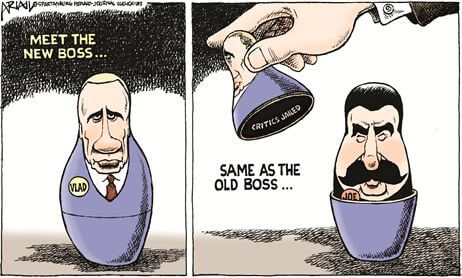 Putin has been the face of Russia since 2000. Since then, he has changed his country’s constitution to both retain his power and extend it. Early in his tenure he enhanced the lives of his people, but greed and a love of power have taken control.
Putin has been the face of Russia since 2000. Since then, he has changed his country’s constitution to both retain his power and extend it. Early in his tenure he enhanced the lives of his people, but greed and a love of power have taken control.
In the West, the most oft-quoted of Putin’s words are from a 2005 Kremlin speech in which he ” … characterized the collapse of the Soviet Union as the ‘greatest geopolitical catastrophe of the Twentieth Century’.” (Wikipedia) These words are quoted for good reason: they provide a good insight into what motivates Putin. Most of his actions on the international stage since then have been about regaining international respect for Russia. The problem is, Putin has the belief that aggression is the way to achieve that.
Putin’s attempt to gain respect will not work long-term. Amongst those he wants recognition from the most, he is only increasing distrust and disgust. His military ventures are also damaging the economy of his country. So far, he has maintained the support of ordinary Russians. That looks like it could change in the near future.
Economy
Putin was elected in 2000 on a promise to reform his country’s economy, which had gone steadily downhill since the break-up of the Soviet Union. He negotiated the so-called “Grand Bargain” with the Russian oligarchs which saw a significant increase in government coffers. Putin improved the lives of ordinary Russians following his re-election in 2004. He launched a series of National Priority Projects. These improved healthcare, education, housing and agriculture. They also enhanced Putin’s popularity.
However, Putin failed to diversify his country’s economy or put the increased revenues into self-sustaining projects such as was done in Norway and the Shetland Islands. Russia relied on, and still does, oil and related products for around two-thirds of their export income. Thus, with the Global Financial Crisis in 2008 and the fall in the price of oil, GDP per capita took a big hit.
At the same time, Putin’s military ventures in Georgia, Crimea, Ukraine, and Syria, and the ongoing cost of supporting Transnistria, are costing the country dearly.
Russia also has extensive international economic sanctions to contend with. They need international help to drill their oil, for example, as they are unable to make all the equipment themselves. One of the real reasons Putin wanted Crimea was not protection of ethnic Russians. It was the oil just off the coast. He has been unable to drill that due to the sanctions. Thus, like Transnistria, Crimea has become a drain on the Russian economy.
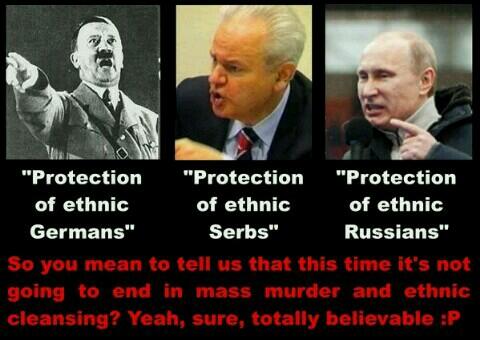
The Economy and the Russian People
In the past, Putin has always maintained huge foreign reserves. Russia also has a strong positive trade balance. However, he has been spending this money hand over fist since he began interfering militarily in Ukraine. The spending has increased greatly since he became more active in Syria. He protected ordinary Russians (and maintained his personal popularity) from the worst of the economic crisis by using the reserves. However, in just two and a half years, those reserves have shrunk by two-thirds. Things are now so bad, it is hitting ordinary Russians in the pocket. Forbes reported in November:
While the depleted funds have been used to bolster the hemorrhaging national budget, the larger economic crisis has plunged millions into poverty and all but eliminated the gains in living standards made in Russia in recent years.
Russia’s “rainy day” plan, the Russian Reserve Fund (RRF), is among the hardest hit. Estimates now predict that the RRF may become insolvent as early as this year [i.e. 2016]. Although the Finance Ministry is taking steps to avoid such an outcome by selling foreign currency to finance the budget, federal expenses are still depleting reserves at an alarming rate.
Increasingly, average Russians are feeling the pinch. A recent survey by Dozhd TV, one of the country’s last remaining mostly-free media outlets, found that some 74% of Russians recognize that there is an economic problem within the country. An equal number believe price inflation represents the most significant problem they face, while half of respondents (49%) believe poverty to be the most pressing, and almost as many (43%) identified unemployment as the most acute issue. And while Russia’s increasingly authoritarian political climate makes opinion surveys notoriously unreliable, the findings nonetheless suggest that trouble could be brewing for Mr. Putin’s government.
Freedom of the Press and NGOs
Early on, there were few who noted there was a dark side to Putin’s rule. Those who did tended to disappear. Russia is 148th out of 180 countries on the 2016 Reporters Without Borders World Press Freedom Index. Their 2016 comment on press freedom in Russia reads:
What with draconian laws and website blocking, the pressure on independent media has grown steadily since Vladimir Putin’s return to the Kremlin in 2012. Leading independent news outlets have either been brought under control or throttled out of existence. While TV channels continue to inundate viewers with propaganda, the climate has become very oppressive for those who question the new patriotic and neo-conservative discourse or just try to maintain quality journalism. The leading human rights NGOs have been declared “foreign agents.”
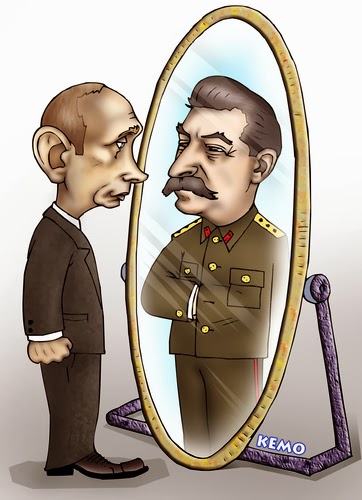 On 1 January 2017, the Moscow Times reported that the Russian Justice Ministry has declared yet another NGO (non-government organization) a “foreign agent” and blacklisted it. The SOVA Centre is a think tank that conducts research in areas such as nationalism, xenophobia, and racism. The Justice Ministry also declared the Levada Centre, the only national polling agency considered independent a “foreign agent” earlier in the year. The Moscow Times reports there are currently more than 80 NGOs blacklisted as foreign agents in Russia.
On 1 January 2017, the Moscow Times reported that the Russian Justice Ministry has declared yet another NGO (non-government organization) a “foreign agent” and blacklisted it. The SOVA Centre is a think tank that conducts research in areas such as nationalism, xenophobia, and racism. The Justice Ministry also declared the Levada Centre, the only national polling agency considered independent a “foreign agent” earlier in the year. The Moscow Times reports there are currently more than 80 NGOs blacklisted as foreign agents in Russia.
More and more, Putin’s Russia is either forcing independent actors out of existence or bringing them under the control of the government.
Corruption
Allegations of corruption have dogged Putin’s political career. Prosecutors investigated him in the early 1990s when he was an official in the St Petersburg administration. They recommended his dismissal. For unknown reasons this didn’t happen. Further, prosecutors mysteriously dropped a criminal investigation in which he was a suspect a few months into his presidency. According to Wikipedia, four months after that “… yet another case … was dropped “for lack of evidence”, in spite of thousands of documents passed by Swiss prosecution.”
Russia is one of the more corrupt countries in the world, and that hasn’t improved under Putin’s leadership.
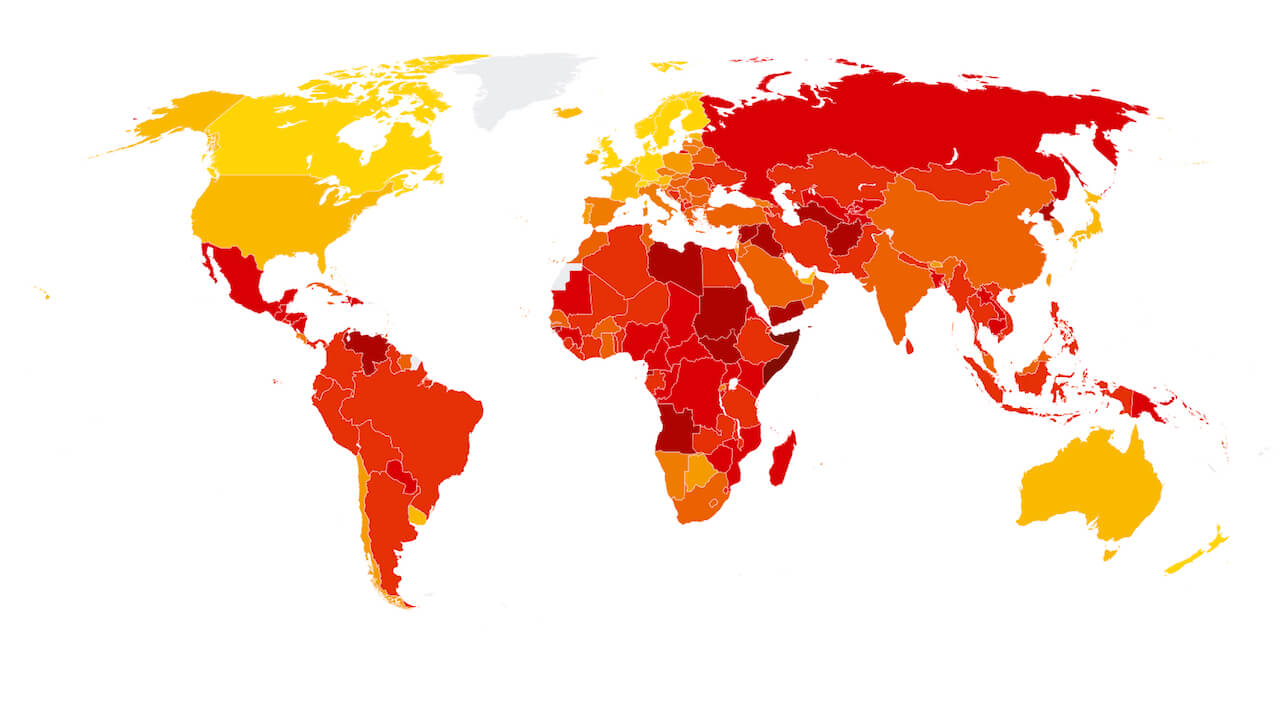
2017 Corruption Perceptions Index. The lighter the colour, the lower the level of corruption perceived. (Click graphic to go to source and interactive map.)
Putin showed his attitude to corruption with a new law in early 2015. It slashed the penalties for a corruption conviction. For example, previously, the fine for taking a bribe was fifteen times the amount of the bribe. The new law reduced it to five times the amount.
Religion
Russia has become more and more conservative under Putin’s leadership. Early in his career, religion does not seem to have been important to him. However, his mother had him secretly baptized into the Russian Orthodox Church as a baby. In the 1990s he appears to have had some sort of born-again moment after surviving a car crash and house fire. Since then, this has changed.
The Russian Orthodox Church is extremely conservative, and informs much of social policy. This is most easily seen in the country’s anti-gay laws.
State-Sponsored Homophobia
Conservative religious attitudes to sexuality bolster anti-gay laws. At the same time, there has been an effort to increase Russian nationalism. The two combine in the national consciousness to equate being gay with being anti-Russian. Russia routinely bans gay pride rallies. In 2011, the European Court of Human Rights fined them for banning 164 pride events and marches between 2006 and 2008. Russia quietly paid the fine and continues to ban them.
Mic.com did an excellent analysis of Russia’s anti-gay laws in 2013. It notes that the basis of Putin’s war on gays is Article 6.21. They report its wording thus:
Propaganda is the act of distributing information among minors that 1) is aimed at the creating nontraditional sexual attitudes, 2) makes nontraditional sexual relations attractive, 3) equates the social value of traditional and nontraditional sexual relations, or 4) creates an interest in nontraditional sexual relations.
Anti-Gay Laws May Increase
In November 2015, PinkNews reported that some want to extend the law to cover all public displays of affection between gay people. The Bill does not appear have gone to the duma yet. The politician who drafted the Bill, Ivan Nikitchuk, said to Russian newspaper Izvestia (Известия):
(Google translation from Russian, with a little tweaking.)
“I think that the problem … is an acute and topical one, as it affects the social ills of our society and is primarily concerned with the moral education of the younger generation… Unfortunately, the … wording adopted in 2013 … which prohibits propaganda of homosexuality proved to be insufficiently effective, so we propose a new measure.”
Nikitchuk says … homosexuality, “is a huge threat to every normal person, which can affect children or grandchildren …
“And as in the biological sense … is ultimately the same as that of death; homosexuality is a mortal threat to all humanity.”
FGM
Even the Russian Orthodox Church surpassed themselves earlier this year though. In August NGO Russian Justice Initiative (RJI) released a report on FGM in majority-Muslim villages in the Caucasus. In showed the practice was common in the region. A leading Muslim cleric from the area, Ismail Berdiyev, said:
All women should be circumcised so there would be no debauchery on earth, so that sexuality is minimized. The Almighty created woman to bear and raise children. [FGM] would not affect that. Women would not stop giving birth. But there would be less promiscuity.
According to The Telegraph,
He went on to clarify that although Islam does not prescribe the practice, “it is necessary to reduce female sexuality. If it was done to all women, it would be very good.”
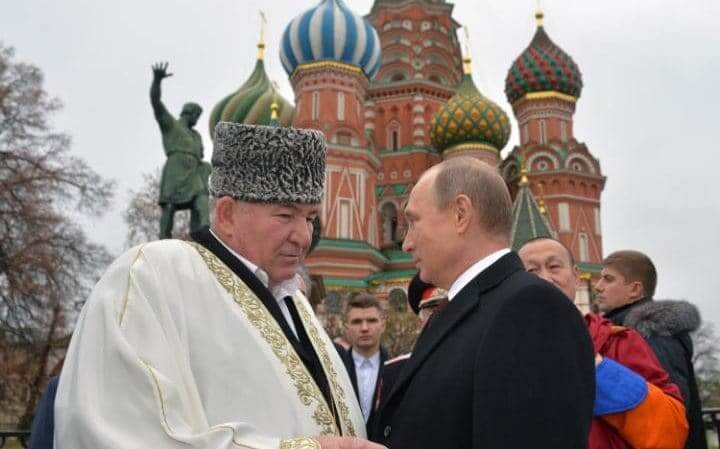
4 November 2015: Ismail Berdiyev with Putin (Credit: Alexi DruzhininAFP/GETTY IMAGES)
Support for FGM by Russian Orthodox Church
The comments caused outrage in Russia. However, senior arch-priest and former church spokesperson Vsevolod Chaplin took to Facebook and announced his support for Berdiyev. The Guardian summarized Chaplin’s post thus: “traditional practices should be allowed to continue without interference.”
Putin’s government took the denial stance. The Guardian further reports:
Meanwhile, some activists claim the RJI report into FGM was politically motivated as it was released just weeks before the parliamentary elections.
According to the Moscow Times, presidential human rights council member and journalist Maxim Shevchenko called the RJI report “a deeply inappropriate hoax” perpetrated by liberal political forces in order to destabilise Dagestan.
(Chaplin later deleted his post and denied he’d ever written it. Berdiyev withdrew his initial comments, but made new ones about women’s main role being childbearing.)
The majority in Russia do appear to accept that FGM is widespread in Dagestan and is part of the appalling record of women’s rights in the area.
Putin’s 2017 at Home
Putin increased his international visibility in 2016. He is intervening militarily in Ukraine and Syria, and increasing his activity on the borders of the Baltic states. His interference in the elections of (at least) Ukraine, Germany, France, and the United States in well known. This has all made him an international player, but no one trusts him which will be a problem for him long-term.
And it all costs. Putin doesn’t have the money to prop up his economy for much longer. He will continue to manipulate his image in the Russian media. Whatever he does though, people will notice they are getting poorer and less of them have jobs. He will have to start paying attention to home if he wants to retain control there.
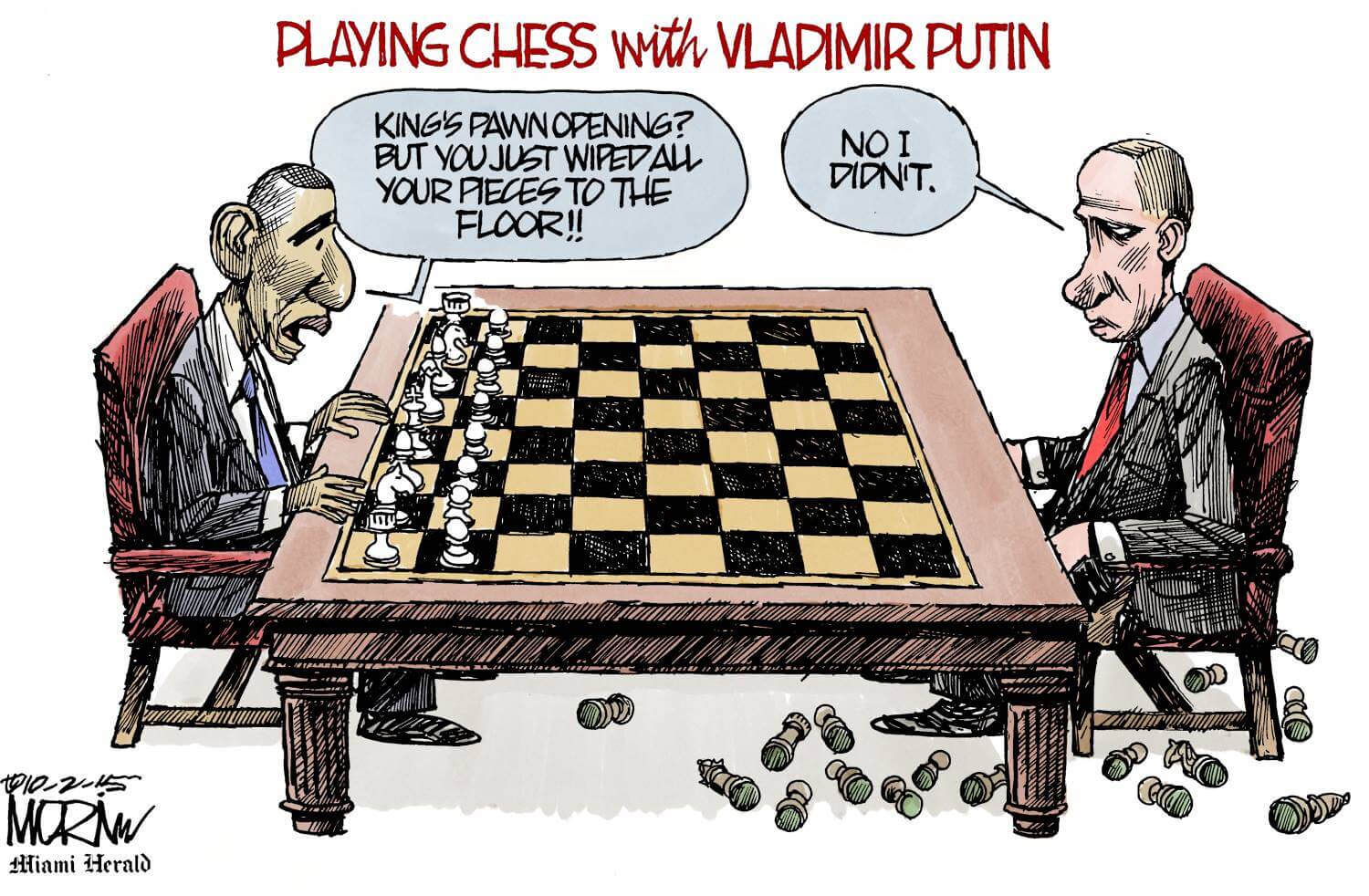
If you enjoyed reading this, please consider donating a dollar or two to help keep the site going. Thank you.

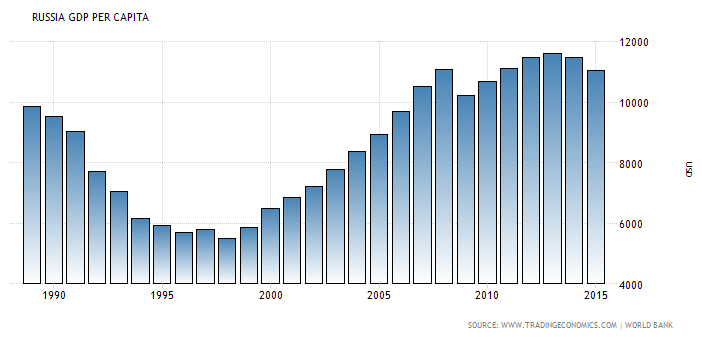
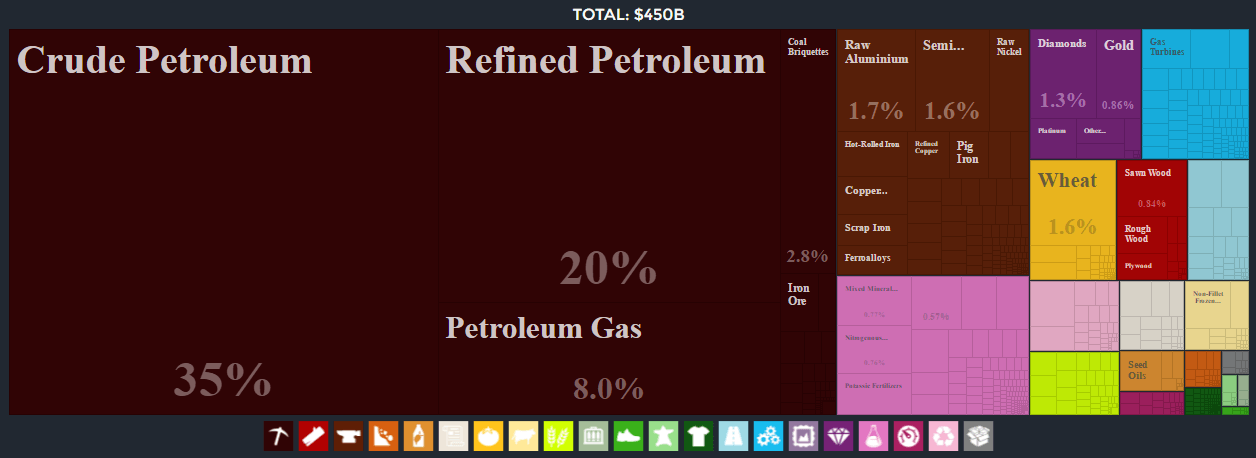
Excellent report Heather. I’m sure hoping your prediction that Putin will run into difficulty long term is encouraging. I’d hate to see Russia make it’s way back into a Soviet Union era power with Putin still at the helm.
“born-again moment after surviving a car crash and house fire”
I read that a lot of this story is a fabrication used to win sympathy from W. Bush when he came for a visit here in the US. He wore a crucifix around his neck and apparently convinced Bush that he was someone he could work with.
My fear is who comes after Putin. With the systematization of corruption and the movement to the authoritarian right, the environment does not bode well.
He’s 64 yrs now. In principle he could carry on for another 10 or 15. The only good news I can see is that he’s limited by a weak economy, oil is quickly becoming nothing to bank on. He owns one antique aircraft carrier.
Having witnessed Trump, you can see why people support Putin. There is really no talking to people who are taken in by the cult of personality.
Thanks Rick.
Yeah, GWB did say he’d looked into Putin’s eyes and saw a man he could trust. Sucked him in real good. I think plenty in the Obama administration were sucked in too. However, the story of his secret baptism is included in his official online story, as is his increased religiosity. The same biography does not include the fact his wife left him some time ago. The Russian Orthodox church is even more anti-divorce than the Catholics so he wants to maintain the good marriage illusion. He’s with a new younger woman now, but I don’t know anything about her (I haven’t tried to find out). She is kept from public view.
He disappeared for a few weeks last year and no one seems to know where he was. Speculation includes a honeymoon and a facelift. I think he had some form of major surgery, but I really have no idea.
“the story of his secret baptism is included in his official online story”
Ha! I’m surprised you find the “official online story” in the least bit convincing. It probably says something about the fact he never signed off on the murder of his political rivals, as well. I’m prepared to believe Putin is likely to construct his image as carefully as a pop star. 😎
I’m not convinced by it. I’m just saying that whether it’s true or not, it’s something he wants people to believe about himself.
He likes that story because it worked on Bush. I’m a bit skeptical of believing the man whose KGB job was to talk to others and get info out of them. He can be very charming and basically hold a mirror up to you so you think he thinks just as you do. It’s like the Force – it only works on the weak minded.
Putin knows he needs to keep power as it is all or nothing. He’s either the most powerful person in Russia with access to large sums of money, or he’s no one or worse, dead. His biggest fear is an uprising of the people.
As for his economic reformers, he did clean up the mess Yeltsin made but most of the credit goes to Hermann Gref.
I bet there’s a lot being invested in security for that flash compound he’s building.
Someone like him has to buy support because no one trusts him once they get to know him. His relationships are all transactional.
I agree about his biggest fear too.
He needs all the money he’s fraudulently acquiring for if/when he loses power.
“His relationships are all transactional”
Remind you of anyone?
Thanks for all this pertinent information Heather. I knew Putin was corrupt, but I had no idea how pervasive and insidious the corruption was. It’s really frightening; Russia is transparently on the authoritarian path towards much human and environmental suffering. And knowing this guy is seen as a great leader by the president elect is beyond disturbing.
If I hadn’t already written so much, I would have gone into some of the parallels between Putin and Trump in the way they Trump seems to be planning to rule. For example, he’s going out of his way to discredit the media so that people believe him and not them when they call him out for his lies. There was another piece about it in the Washington Post just today: https://www.washingtonpost.com/blogs/plum-line/wp/2017/01/02/yes-donald-trump-lies-a-lot-and-news-organizations-should-say-so/?postshare=5541483396733795&tid=ss_tw&utm_term=.b8b3b6859b9b
Thanks for the link. The media is one of our only defenses against someone like Trump. They did a horrible job covering Trump during the election, and now they better wake up. It’s the media that is the first thing to go in an authoritarian regime…unless said media goes along with the regime. I hope they understand what they’re up against.
Nobody needs to go out of their way to discredit the traditional liberal lamestream media, which long ago shredded whatever credibility it may have enjoyed. Nobody will mistake Obama’s pathetic fawning lapdog for a reliable watchdog.
Nor does the media’s histrionic name-calling (directed at anyone who’s not a liberal Democrat) have any purchase. They’ve simply cried wolf too many times by labeling everybody they disagree with as a Nazi.
Technology is a factor, but the media really has only itself to blame for its own unlamented demise.
The only meaningful thing the mainstream media have in common with the liberal establishment is that both have become completely corporatised, which is to say they have far too much in common. But it’s not a liberal bias, it’s the sort of conservatism that comes with the desire to avoid rocking the boat above all else.
Great piece from Garry Kasparov today about the personal nature of Putin’s approach–
https://www.washingtonpost.com/posteverything/wp/2017/01/03/the-u-s-doesnt-have-a-problem-with-russia-it-has-a-problem-with-vladimir-putin/?utm_term=.8aed92cad25f
“…the recipe for stopping Putin is composed of familiar ingredients. Isolation and deterrence, instead of more futile attempts to find a nonexistent common ground. John F. Kerry infamously said that sanctions against Russia for invading and annexing part of Ukraine “weren’t personal.” He was right — and, therefore, he was completely wrong. Only the personal will work. Target and expose the vast wealth Putin and his cronies hide abroad. Freeze their funds and their companies, revoke their visas and memberships. Stop providing Putin with the credentials of an equal when he should be treated like a pariah. “
I saw Kasparov on CNN a few weeks ago. I was impressed with him then too. I look forward to reading this. I think the personal is the way to go as well.
I think Russia has been playing for time over Syria, pretending to seek a diplomatic solution when they have no intention of closing a deal. Their solution is to murder all Assad’s opponents so they have influence in the Middle East again. As a bonus there’s a refugee crisis to destabilise Europe, make democracy look bad, and enable fascist and nationalist elements.
Did you hear his interview with Sam Harris? It was very good as well. I really liked how he pointed out that politicians keep looking to the past with Trump’s “Make America Great Again” & Putin’s desire to return to the Soviet days.
I meant to listen then forgot! Thanks for reminding me. 🙂
Heather, your post is good and clearly Putin is a thug, but I’m not sure why we should celebrate Kasparov, who wouldn’t have normalized relations with Cuba, nor negotiated the Iran nuclear deal either. He seems only to believe in military confrontation. I started listening to the Harris podcast last week, but had enough five minutes in when they set American exceptionalism as the context for the discussion. Something to the effect that “we morn the loss of one life, while they revel in the death of thousands”. The worst people to take advice from are those who claim to be realists while ignoring so much of what is real.
I still haven’t listened to the podcast, so didn’t know that. His analysis of Putin is good I think. If he’s opposed to the Iran deal and the normalisation of relations with Cuba, I’d disagree with him there obviously.
I often think people like Kasparov feel obliged to take the exceptionalism view in order to gain acceptance in the US by the general public. Immigrants are expected to be suitably grateful for their new life and awed by the wonders of America. I never know how much is real and how much to take with a grain of salt.
That’s interesting, I hadn’t thought of that. I generally credit defectors/immigrants attitude to the US as being genuine gratitude due to the suffering endured in their home countries. But while the suffering is no doubt real, such people too often extend their gratitude so far as to ignore the flaws of their adopted country. I guess that’s understandable, but it can be very bad in the US given our lack of introspection on foreign policy matters. Defectors are often huge hawks whose opinions get amplified out of proportion in a country that wants to hear what they’re saying.
The main issue that immediately comes to mind re Kasparov’s Putin analysis is that it’s all about Putin and not Russia. While the details re Putin seem true enough, why wouldn’t someone else have done some similar things in his position? For instance, I’ve argued before that the expansion of NATO to Russia’s doorstep, with or without a promise not to do so, was a strategic blunder that any Russian leader would have to respond to with a show of military force. (As I posted in another thread, here is an interesting article from Scott Ritter on the US/Russian relationship and potential for nuclear conflict. Ritter’s hopes that Trump might handle this well seem quite wishful, but his argument that the course we’ve been on is very dangerous is difficult to argue with:
http://www.truthdig.com/report/item/a_genuine_us_reset_with_russia_is_long_overdue_20161115) There is also all the history of the West rushing in to take advantage of Russia’s weak economic position in the early 1990’s, rather than putting the emphasis on ensuring strong democratic institutions were built first. Putin may be the worst possible person for the moment, but a case can be made that an authoritative backlash was quite likely in any case given the circumstances.
And now Putin has set Russia on a path that is likely to continue after he goes, unless a real reformer gains power, which is unlikely given the problems the country faces. It was argued by conservatives who wanted to impeach Bush for his abuses of executive power that the Constitution would be permanently weakened if not checked before the next President came in. Of course there was no check and Obama has made things worse with his crackdowns on whistle blowers and the journalists they work with. All of this will make it easier for Trump to truly abuse the system. Likewise, Putin’s successor will be given all the tools needed to extend Russia’s authoritarian approach into the future. This only looks like it’s all about Putin because he is so smart and has played his hand so well. But it’s not really all about him at all, so Kasparov saying so does need that grain of salt.
The over reaction of refugees makes sense. I knew a Jewish MD from Russia who has horrible memories of persecution. When I tried to ask him what his experience has been working under Obama-care, he revealed complete contempt for it, saying it was a total waste and failure. The people served by it are actually undeserving! He was so anti-socialist he had gone all the way to Ayn Randian libertarian. I said annual checkups for the poor should save money. He said no, it really doesn’t do any good. I think he was, like Kasparov, over reacting.
I think it Russia as well there isn’t the same sort of social safety net. Sure, they were communist but that doesn’t mean everyone was treated fairly. A Russian I know said in Canada we had things like social safety nets; in Russia, you die on the street if you can’t work. She applied this “social safety net” to all of North America. I told her that concept was more Western than just North American.
Anyone remotely acquainted with the wretched history of the earth is awed by the wonders of its last best hope. And (one need not wonder) is sincerely and humbly grateful.
@j.a.m I’m probably going to regret asking this, but what is the “last best hope.”
Fareed Zakaria on those around the world who are celebrating Trump’s victory. One of the things he notes about them is that they are all pro-Putin. https://fareedzakaria.com/2016/11/17/what-trumps-international-admirers-are-celebrating/
Seems a lot of people really love them a good authoritarian.
Unfortunately!
I’ve never understood that mentality. From earliest childhood I hated being told what to do. I just don’t get why everyone isn’t like that. I’m happy to follow the law – I’m not an anarchist or anything. But I need a reason. There’s a good reason for speed limits and safety belts and universal healthcare. They are better for everybody. Telling people what to think or feel makes no sense.
I know what you mean. I have a friend who is a huge Trump supporter. The other day they posted simply “Putin rocks!”. I can’t bear to engage with it.
Anyway, this might help explain why authoritarians appeal to some:
https://amoment2think.files.wordpress.com/2011/02/blog.jpg
I just looked at that on my tablet – I’m going to have to try again on a bigger screen later!
I was thinking about this while driving home one day. I wondered what the evolutionary pressures were to produce so many followers and so few independent thinkers and I suppose it makes sense in that too many independent thinkers could impact coorperation that has been shown to be vital to our survival. Too many cooks in the kitchen! Leaders can’t lead if no one will follow them.
Yeah, good point. And it’s the way humans learn as infants too – more of us copy than innovate when we’re young. That’s probably survival too – run when we’re told and don’t wait until you can see the predator. Unfortunately, it also means believing all the myths we’re taught are fact around religion and most spend their lives believing the same thing their parents do.
Remember too that we evolved to know and relate to small groups of people and lived on the savannas in such groups of 100-150 individuals. No doubt there were leaders, but the dynamic is so different when you know everyone personally. Now we have to relate to billions, and while I believe we have the intellectual capacity to do so, our natural temperament makes it very hard. This shouldn’t be used as an excuse for failure.
@HH: You hate being told what to do? Wow, great to hear you’ve embraced your inner libertarian. Until now your commentary suggested you favor concentrating power and resources in the hands of politicians and bureaucrats so they can make us all conform to so-called “progressive” norms (trashing conscience rights in the bargain). Glad you’ve seen the light!
@j.a.m. Have you not taken in anything I’ve ever written? You’ve just said you thought I was a part of the authoritarian left, which is a group I’ve always railed against. I’ve constantly stood up for freedom of speech, including for those I don’t agree with. That’s not the position of the regressive left and the main reason I oppose them.
That doesn’t mean I give up my right to argue against those I disagree with. I have a problem with authoritarians on both the left and the right. Being anti- authoritarian is NOT the same as being a libertarian, which imo is a thoughtless, selfish, ideology which is about the rich getting richer and f***everyone else. It is damaging to society and doesn’t result in what it says are its goals.
Taken to its logical conclusion, libertarianism would return society to the structure of medieval times. That would include a significant shrinking in the economy. An economy grows better when the wealth is spread amongst more people. That is better for everyone.
And a society is better when it is more accepting of difference too. Those who reject equality for others based on race, religion, sexuality, gender, gender identification etc are creating division and therefore conflict.
It also amazes me how the definition of libertarian in the US includes things like being anti-choice. They clearly care more about political power and adopt that stance officially in order to align themselves with the GOP.
In NZ, where the Libertarians are a separate political party, almost no one votes for them. Even when a popular former captain of the All Blacks was their leader, they couldn’t even manage 1%. The bankruptcy of their ideology is clear to almost everyone.
Of course, our society is generally more egalitarian than yours, so they do better there.
Here’s a very long and very readable piece on the current state of play in Syria. The writer, who I’m not familiar with, is firmly on the left, yet while his politics are very clear, it is still one of the most coherent assessments I’ve read about what’s going on and what the stakes are.
http://www.counterpunch.org/2017/01/26/game-change-syria-interrupted/
I find this article extreme extremely biased in favour of Russia. There are a lot of things being left out, like the fact Putin has been providing weapons etc to Syria from the beginning, that Assad attacked his own people when the protests were peaceful and used chemical weapons and barrel bombs against civilians. That the opposition to Assad included many moderate groups in the beginning and that was who the US was supporting, and they did so because of Russian intervention on the side of Assad, and a whole lot more.
I’m certainly not saying the the US was on the side of the angels, because they definitely weren’t.
The rest of the article misses out several important points too in opposition to Russia. The attack that the Kiev government is “Nazi-infested” is propaganda that comes directly from Russia. Fascist parties got about 1% of the vote in Ukraine, which no one would ever know if they listened solely to Russian-approved media. The former president, who was a Putin-puppet (as opposed to the current US-puppet) fired on his own people, killing dozens, ffs! His majority was one million. He got two million votes from Crimea, so he was on his way out anyway. Also, he was introducing a policy that a majority didn’t want that aligned his country economically with Russia rather than the EU. Most people want to align with the EU because it’s wealthier and therefore there’s more opportunity there.
From Wikipedia: “CounterPunch-sourced news stories have frequently featured in the Project Censored annual list of top 25 “underreported, mis-reported, or censored” news stories…”
Thanks, Heather, I’m keen to sift through this stuff, so will respond when I have more time. For now, I’ll just inquire as to why you included the Wiki quote at the end? You seem to want to discredit the writer via association with CounterPunch, yet this is a plaudit for them.
I just wondered who they were so I looked them up. I wasn’t necessarily making any judgment. Like you, I didn’t know who they were and I wanted to know if they were independent. They appear to be, which is a good thing. I obviously don’t agree with them, but as long as they are speaking with their own voice they can go for it as much as they like.
There are news organisations that are funded by governments all over the place, and whether I agree with them or not I tend to be more suspicious of their viewpoint.
What I think I’m saying is people who disagree with me genuinely are OK, but people who disagree because they’re paid to give me pause.
Agree with that. I’ve been reading CounterPunch for years. It was the particular writer I’m not familiar with.
I agree too that negative things about Russia have been left out. In fact, Kavanagh is making a (sometimes begrudging) case for their intervention. To be honest, I don’t know what to think about a lot of this. On the one hand, all sides are covered in blood of innocents and I have sympathy with those who say we shouldn’t provide moral support to either side, who are just trying to gain in geopolitical terms from a desperate situation. Yet he argues ISIS would be in Damascus now if not for the intervention. Are we confident it wouldn’t? And what are the lessons we need to learn about these kinds of disasters? One surely involves the importance of adherence to international law. The US’s habit of intervening when and where it wants is a big part of how we got here. Russia seems technically within international law in supporting a sovereign govt, no matter what we think of Assad. International laws have been agreed not to guarantee humane governments, but to ensure the world doesn’t descend into a might-means-right chaos. This isn’t always going to lead to an outcome we’re happy with, but surely the alternative of having no rules has been demonstrated to be worse.
I’ve said before that I don’t trust Putin as far as I can throw him, but I haven’t heard a convincing argument that this was the worst outcome either. I can’t see where any of the realistic outcomes would be good.
When the war in Syria started, DAESH didn’t exist. They moved in later to take advantage of the situation. Al Qaeda/Al Nusra Front weren’t big early on either. The rebels were dominated by fairly moderate groups, and they were winning.
The US wasn’t intervening because they were worried that any weapons etc they provided would end up in the hands of rebels they didn’t like, like Al Nusra, Khorosan Group etc. (Incidentally, the same reason they refused to help the French resistance during WWII.)
It looked like Assad would lose. Then Russia began to supply him with weapons, ammunition etc. The slide slowed but didn’t stop. It was confirmed Assad was using chemical weapons and still Obama did not intervene despite the “Red Line”.
Assad was losing. Russia represented Assad in negotiations and continued to supply him with weapons etc, as did Iran. Quds forces also went to Syria. The US supplied non-lethal support to the rebels.
The “bad rebels” were getting stronger. They had more money, more supplies, and Turkey were allowing fighters through their borders for their own reasons. DAESH also paid their fighters significantly more than more moderate groups. As in Iraq, many joined them for reasons of survival.
The US began bombing raids against DAESH, Al Nusra, Khorosan Group etc. from Iraq. They warned Assad to keep out of their way while they were doing it or they risked being bombed too.
Assad was losing and Russia intervened on their side. They also began bombing raids. They told Russians and anyone else who’d listen that they were only bombing DAESH, but almost all their raids were against moderate rebels – the ones who had started by protesting peacefully and been attacked by Assad.
When Russia was proven to be bombing civilians they said it was the fault of the US because the US wouldn’t provide them with the location of moderate rebels so they could avoid them. Of course, Russia couldn’t be trusted with the location.
After pretending to negotiate a peace for months and Russian intervention, Assad is now winning. The moderate rebels have been almost completely wiped out. The bad ones are almost the only ones left and no one wants them in charge. Assad is the best option left. For the first time since WWII, Russia is a player in the Middle East.
And he will outmanoeuvre Trump every time.